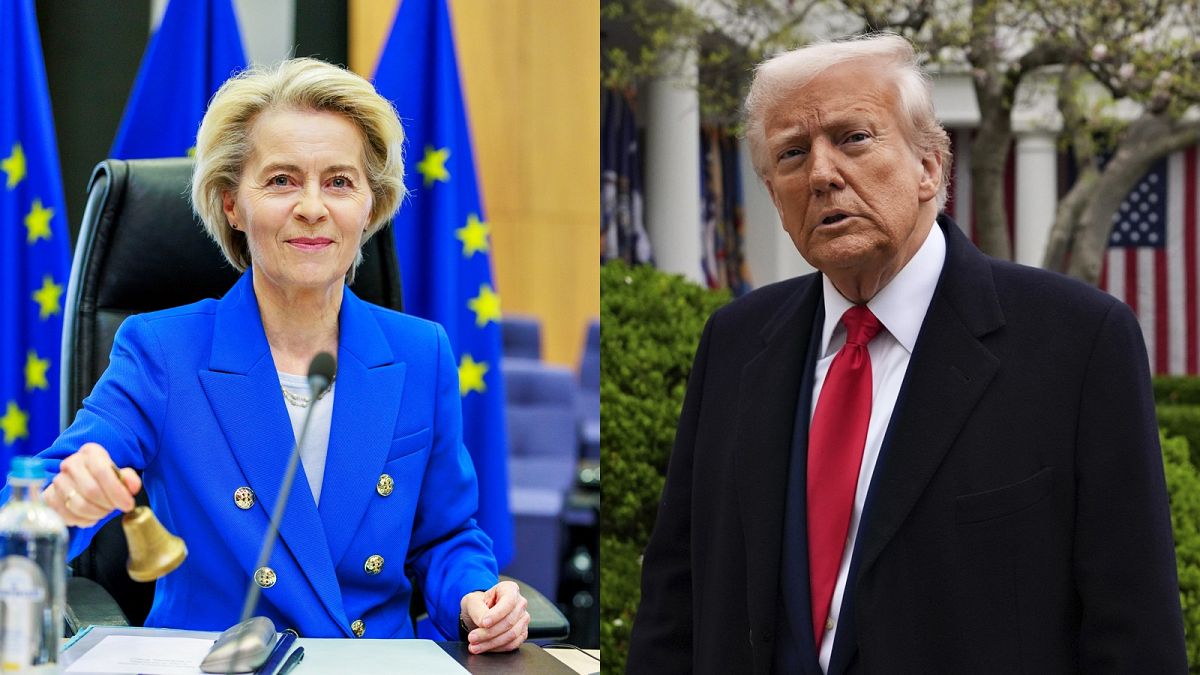Ursula von der Leyen and Donald Trump will seek to meet at “the right moment” when an agreement to resolve the tariffs imposed by the American president is on the table and ready to be signed, the European Commission has said.
The commitment to meet was made on Saturday during the funeral of Pope Francis, when the two leaders shared what was described as a “brief interaction”.
The conversation broke a protracted period of silence that had alarmed Brussels and member states and left crucial discussions in the hands of lower-ranking officials.
Before their encounter in the Vatican, the Commission president had not spoken with Trump since his return to the White House. Trump, however, has hosted other EU leaders in the Oval Office, like Italy’s Giorgia Meloni and Ireland’s Micheál Martin.
“There is no date, for the moment, for such a meeting,” Paula Pinho, the Commission’s chief spokesperson, said on Monday.
“There was an interest expressed. The right moment for it will be when there is a package to be agreed upon at the level of the two presidents.”
That package is meant to cover a “number of issues”, most notably tariffs, which are currently being negotiated at the technical level, Pinho explained.
The Commission’s goal is to advance the technical talks, flesh them out and turn them into a specific agreement that can be presented to von der Leyen and Trump.
No further details on the prospective meeting, like a possible location, were provided.
“When the moment is ripe to have a discussion and an agreement at the level of the two presidents, at the highest level between the United States and the European Union, that will be the good moment to meet,” the spokesperson said.
Trump’s sweeping tariffs have targeted virtually every nation on earth.
The EU, an exporting powerhouse, was slapped with a 20% rate on all goods, a figure that officials in Brussels slammed as “neither credible nor justified”. Separately, the White House imposed a steep 25% duty on imports of steel, aluminium and vehicles and threatened to do something similar with semiconductors and pharmaceuticals.
Following a stock market crash and a steep rise in US bond yields, Trump made a U-turn and agreed to a 90-day suspension of his self-styled “reciprocal tariffs”. As a result, the 20% levy was reduced to 10%, while the separate 25% duty remained in place.
Von der Leyen replied by delaying, also for 90 days, the first raft of EU countermeasures, which were designed to target nearly €21 billion in America-made products.
“We want to give negotiations a chance,” she said earlier this month as she repeated her offer for a “zero-for-zero” tariff deal on all industrial goods.
In the dark
The mutual suspension opened a window of opportunity that Brussels is keen to seize.
But despite the effort to maintain a constant dialogue with the White House, the Commission, which has exclusive competence to determine the bloc’s commercial policy, continues to be in the dark about what exactly Trump’s endgame might be and what sorts of concessions might be needed to make him change his mind.
Officials suspect the Republican is torn between his goals to rebalance trade relations, establish a new source of revenue through the collection of steep duties and promote America’s re-industrialisation, without knowing exactly which one to prioritise.
Although Trump has voiced his willingness to meet with representatives from other nations and strike “fair” deals, he stands his ground and defends his disruptive policy.
“I think the tariff plan is doing very well. We’re resetting the table. We’re gonna make our country very rich. Very, very rich. It’s already happening,” Trump said last week.
Making matters more complicated is the White House’s insistence that “non-tariff barriers” should also be discussed as part of a deal. Washington has pointed the finger at value-added tax (VAT), food safety standards and Big Tech regulations.
Brussels argues none of those issues are related to trade flows and should therefore be excluded from any compromise. The idea of decoupling the EU from China to curry favour with Trump has also been ruled out.
Scott Bessent, the US Secretary of the Treasury, described the chaos caused by the tariffs as “strategic uncertainty” and urged countries to remove all trade barriers.
“You’re not going to tell the person on the other side of the negotiation where you’re going to end up and nobody is better at creating this leverage than President Trump,” Bessens told ABC over the weekend.
“He’s shown the high tariffs, and here’s the stick. This is where the tariffs can go. And the carrot is, come to us. Take off your tariffs. Take off your non-tariff trade barriers. Stop manipulating your currency. Stop subsidising labour and capital, and then we can talk.”
Read the full article here


